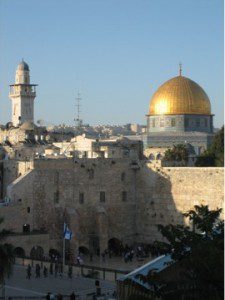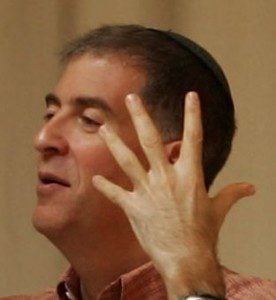
The Muslim Leadership Initiative, sponsored by the Shalom Hartman Institute, has been a topic of great controversy in the American Muslim community and beyond. Altmuslim is publishing a few perspectives, and we welcome your comments below.
By Donniel Hartman
The Shalom Hartman Institute started the Muslim Leadership Initiative at the request of Imam Abdullah Antepli of Duke University. He believed that the Israeli-Palestinian conflict creates toxicity and mutual distrust between the American Muslim and Jewish communities. The enduring conflict stifles any possibility of a meaningful and healthy engagement between these monotheistic communities that share a rich faith tradition.
Instead of working together to advance shared values, the conflict often inspires casual anti-Semitism and extreme anti-Israel sentiments. Regrettably, I too have witnessed how this conflict has inspired members from my community to engage in anti-Muslim and anti-Palestinian bigotry, which I believe betrays the best of our Jewish values.
It was Imam Abdullah’s belief that the Shalom Hartman Institute, an influential, pluralistic and non-politically aligned center of research and education serving Israel and North American Jewry, would be an ideal partner to help connect American Muslim and Jewish communities.
One of the central goals of the Shalom Hartman Institute is to create an enlightened Judaism, a Judaism open to the world and to the best ideas of modernity. At the Institute we work very hard to recognize, confront and overcome the narrowness, bigotry and moral failings within the Jewish community. In MLI, I saw partners to a similar quest and felt a deep affinity with them.
Imam Abdullah and those who backed him posed the following challenge: Could a Jewish and Zionist institution open its doors, its traditions and its narratives to a group of Muslim leaders interested in thinking in a more nuanced fashion about who they are in relationship to Judaism and Israel? My response was, “If you come, we are ready to try.”
Challenging a Muslim Mantra towards Israel
But what constitutes “a more nuanced fashion,” and what would be the nature of the curriculum and its goals? When it comes to anti-Semitism, the issue is relatively simple. In my opinion, by definition, any North American Muslim who comes to study in a Jewish and Israeli institution is not an anti-Semite. Bigotries of any kind feed on ignorance and isolation.
Our educational goal was to broaden each participant’s familiarity with the core ideas and values of Judaism, in order to expand knowledge and enable them to lead North American Muslims in a deeper engagement with Judaism and the North American Jewish community.
When it comes to engaging participants on Israel, however, the issue is far more complex. SHI’s hope was never to create Muslim Zionists, and we know that Muslims in North America are not going to abandon their strong support for Palestinian rights.
Our challenge at SHI was to see if we could fulfill Imam Abdullah’s charge to jointly create a space with Muslims in which they could work on a more nuanced engagement with the Jewish people. Is the only appropriate Muslim response to Israel to recite the mantra, “Israel is an apartheid, racist, colonialist state engaged in ethnic cleansing and mass murder”? Is there any space between a critical view of Israel and its policies and a rejection of Israel’s right to exist?
I recognized the dangers of this mantra, in part, because for many years, we Jews and Israelis had a self-destructive mantra toward the Palestinians. They are “anti-Semitic, child murdering, corrupt terrorists who want to drive us into the sea.”
This mantra allowed us to avoid the hard and necessary work of negotiations; it blinded us to the Palestinians as a people and to our occupation of them. We were protected by a self-defined narrative which ensured the perpetuation of the status quo, under the guise that “there is no one to talk to.”
It was only with the Oslo negotiations, that most Jews and Israelis came to reject this mantra and began to define themselves as pro-Israel advocates of a Palestinian state within the West Bank and Gaza.
I recognize the dangers of all-encompassing mantras, because they lock us into a self-perpetuating dead end. We become isolated from other voices, intellectually boycott anyone who does not share our views and see everything in stark black and white terms without any space for nuance and complexity.
How Should We Engage with Each Other?
For me, the counter-claim that Muslims have Jewish friends who join them in their one dimensional mantra rings as hollow as Israelis who claim to care for Palestinians rights by virtue of the fact that they employ Palestinian workers. To limit Muslim engagement with the Jewish community to anti-Zionist is to condemn Muslims to perpetual ignorance of Jews and Judaism, and alienation from their Jewish partners in North America.
The Shalom Hartman Institute’s response to the proactive initiative of MLI participants was to offer a study program which opened up our tradition as unmediated and uncensored as possible. The curriculum is based on the one used by RLI, our Rabbinic Leadership Initiative, a program to train an elite cohort of North American Rabbis to respond to the challenges facing contemporary Jewish life.
It is a curriculum that engages with the multiple voices within Judaism with regards to Judaism’s and Israel’s central ideas and principles. It involves a constant and self-critical evaluation of the tradition and its role in modern Jewish life, and a constant and critical evaluation of the Jewish people and Israel.
As such, it is not an introductory course in Judaism and Zionism for Muslims, or an advocacy program for one Israeli position or another. Instead, it is an insider’s view into the way Jews think about themselves and their tradition and to debates around who we are and who we want to be.
Will MLI move its participants to reject Palestinian rights? No.
Will MLI enable its fellows to understand Judaism and the Jewish people better? Will they understand the challenges and opportunities of North American Jewish life better? Will they understand the complexity of modern Jewish life better? Will they understand the aspirations of the Jewish people for Israel better? Will they understand the significance of Israel for Jews worldwide better? Will they understand the complexity of the reality which is Israel, and the Jewish debates around its future, better? Will they be able to engage with Jews in North America better?
I certainly hope so. But I know it is not for me to answer.
In turn, will we get to better know American Muslims, appreciate their unique challenges and struggles, and understand their religious aspirations and identification with the Palestinians? For me the answer is clear – I did learn and I am still learning. I am appreciative of MLI for trusting me with their diverse narratives as SHI entrusted them with theirs.

Avoiding a Zero-Sum Game
As a Jew, I do not want to live in a zero-sum-game world with Islam. I yearn to live in a world where Jews, Christians and Muslims of good faith reach out to each other, live with each other, disagree respectfully with each other and most importantly, learn from each other. That will only happen when we have the courage to meet and hear each other.
Learning does not mean to agree with each other. It simply means to open oneself up to be exposed to the other, to learn from their world and to embrace the surprises that this journey might entail. The commitment of the participants in MLI to this ideal is inspiring, and I am committed to helping my community do the same.
I am pained by the relationship between Israelis and Palestinians, but MLI is not meant to solve this problem. The participants do not live in the Middle East, none were elected to represent either the Palestinian people or their cause, nor ever claimed as much.
They are, however, Muslim leaders who are living in a different area and a different cultural climate. Can North America be the grounds for the beginning of a new and different relationship between Jews and Muslims? Can the soil of America incubate a culture of respect, friendship and learning between Jews and Muslims? Can an experiment in America serve as a model for the world? I don’t know. But it’s worthwhile exploring the possibility.
As a Jew and as an Israeli, I want to engage with Muslims. I want to, because it is the way that Jews and Muslims ought to relate to each other. Because every time you open yourself up to meet the other, you grow immeasurably. Because it profoundly impacts on my Institute’s understanding of Islam and our commitment to overcome our own bigotry and biases.
I want to engage with Muslims because it feels like the right thing to do, and sometimes you simply have to do the right thing, and believe that even a small act can repair the world.
Rabbi Dr. Donniel Hartman is President of the Shalom Hartman Institute and founder of some the most extensive training programs for Jewish intellectual, educational, religious and lay leadership in Israel and North America. Donniel is a prominent essayist, blogger, and lecturer on issues of Israeli politics, policy, Judaism, and the Jewish community and the author of The Boundaries of Judaism and co-editor of Judaism and the Challenges of Modern Life.His new book, Putting God Second: How to Save Religion from Itself, is scheduled for publication by Beacon Press in February 2016.











